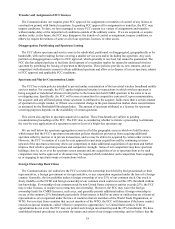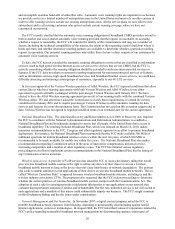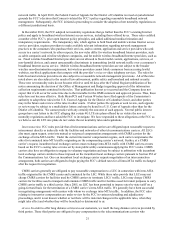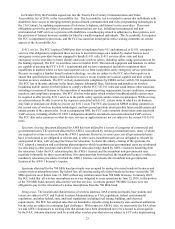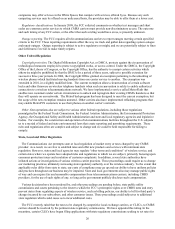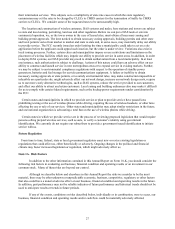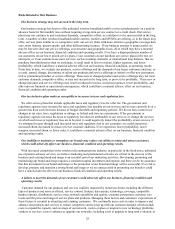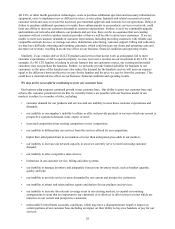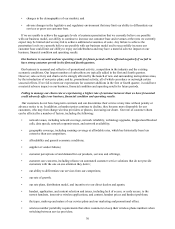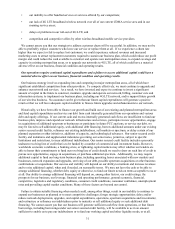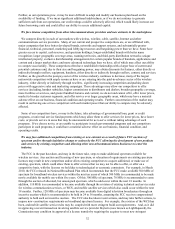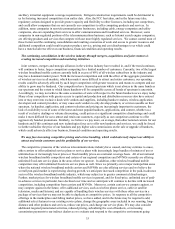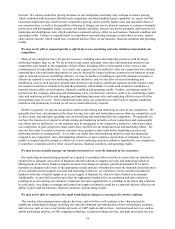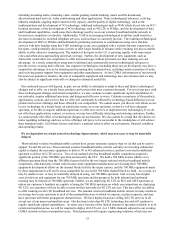Metro PCS 2010 Annual Report Download - page 36
Download and view the complete annual report
Please find page 36 of the 2010 Metro PCS annual report below. You can navigate through the pages in the report by either clicking on the pages listed below, or by using the keyword search tool below to find specific information within the annual report. 26
companies may offer services in the White Spaces that compete with services offered by us. Because any such
competing services may be offered on an unlicensed basis, the providers may be able to offer them at a lower cost.
Regulatory classifications. In January 2008, the FCC solicited comments on whether text messages and short
codes are common carrier services to which CMRS carriers must provide non-discriminatory access. The outcome
and such timing of any FCC action, or the effect that such a ruling would have on us, is presently unknown.
Outage reporting. The FCC requires all telecommunications carriers to report outages meeting certain specified
criteria to the FCC. These reporting requirements affect the way we track and gather data regarding system outages
and repair outages. Outage reporting is subject to active regulatory oversight, and we are potentially subject to fines
and forfeitures if we fail to make timely reports.
Other Federal Regulation
Copyright protection. The Digital Millennium Copyright Act, or DMCA, protects against the circumvention of
technological measures employed to protect copyrighted works, or access control. Under the DMCA, the Copyright
Office of the Library of Congress, or the Copyright Office, has the authority to exempt certain activities which
otherwise might be prohibited by that the DMCA for a period of three years, subject to possible extension for
successive three year periods. In 2006, the Copyright Office granted an exemption pertaining to the unlocking of
wireless phones which facilitated moving handsets from one carrier service to another. The exemption was
extended in 2010, in a slightly modified form. The current exemption allows circumvention of certain software
locks and other firmware on wireless telephone handsets when such circumvention is solely to enable authorized
connection to a wireless telecommunications network. We have implemented a service called MetroFlash that
enables new customers under certain circumstances to unlock and reprogram their existing CDMA handsets so that
they will operate on our networks. The MetroFlash program has been designed to meet the current exemption, but
the scope of the new exemption remains untested. Other carriers also have implemented reflashing programs that
may enable MetroPCS customers to use their phones on another carrier’s network.
Other. Our operations also are subject to various other federal regulations, including those regulations
promulgated by the Federal Trade Commission, the Federal Aviation Administration, the Environmental Protection
Agency, the Occupational Safety and Health Administration and state and local regulatory agencies and legislative
bodies. For example, the construction and operation of telecommunications facilities throughout the U.S. subjects
us to a myriad of federal and state environmental laws that create reporting and permitting requirements. These
rules and regulations often are complex and subject to change and we could be held responsible for failing to
comply.
State, Local and Other Regulation
The Communications Act preempts state or local regulation of market entry or rates charged by any CMRS
provider. As a result, we are free to establish rates and offer new products and services with minimum state
regulation. However, states and local agencies may regulate “other terms and conditions” of wireless service, and
certain states where we operate have adopted rules and regulations to which we are subject, primarily focusing upon
consumer protection issues and resolution of customer complaints. In addition, several state authorities have
initiated actions or investigations of various wireless carrier practices. These proceedings could require us to change
our marketing practices, ultimately increasing state regulatory authority over the wireless industry. To the extent that
applicable rules differ from state to state, our costs of compliance may go up and our ability to have uniform policies
and practices throughout our business may be impaired. State and local governments also may manage public rights
of way and can require fair and reasonable compensation from telecommunications carriers, including CMRS
providers, for the use of such rights of any, so long as the government publicly discloses such compensation.
Various decisions have been rendered by, and other proceedings are pending before, state public utility
commissions and courts pertaining to the extent to which the FCC’s preemptive rights over CMRS rates and entry
prevent states from regulating aspects of wireless service, such as billing policies, our ability to bill for third party’s
charges incurred by our subscribers, and other consumer issues. These proceedings could subject us to additional
state regulation which could cause us to incur additional costs.
The FCC recently ruled that the rates to be charged by competitive local exchange carriers, or CLECs, to CMRS
carriers should be resolved by the pertinent state regulatory commissions. We have appealed this ruling. In the
meantime, certain CLECs have begun filing applications with state regulatory commissions seeking to set rates for




